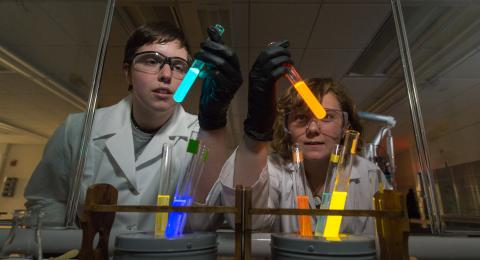The Chemistry (B.A.) major at UNH invites you to delve into the world of molecules where you can immerse yourself in a rich curriculum covering organic, inorganic, and analytical chemistry. You’ll do this through engaging laboratory sessions and personalized guidance, helping to master fundamental chemical concepts and their practical uses, while still having the flexibility to pursue other academic interested through the bachelor of arts path. With ample research opportunities, the program is designed to give you hands-on skills and scientific knowledge in preparation for a variety of career paths to include in pharmaceuticals, biotechnology, research, teaching and more.
What is a Bachelor of Arts in chemistry?
This program is tailored to students who want a comprehensive study of chemistry and desire increased flexibility in course selection. Students nonetheless gain the communication, critical-thinking and problem-solving skills necessary for success in many careers. The B.A. degree offers a broad set of courses in analytical, inorganic, organic and physical chemistry, and a variety of rigorous laboratory experiences. Students have opportunities to participate in cutting-edge research, plus they have freedom to explore a variety of courses outside of chemistry. Those wishing to earn a dual degree or a minor in another discipline should consider the Bachelor of Arts degree.
Why study chemistry at UNH?
You’ll find a program small enough to be personal but comprehensive enough to provide excellent opportunities for challenge and growth, like independent research, leadership and peer-mentoring. You can pursue additional coursework in fields related to your educational and professional goals. You’ll have access to newly renovated laboratories, state-of-the-art equipment and faculty committed to transformative experiences for undergraduate students. With careful selection of coursework, you can engage in a program of study approved by the American Chemical Society. Our graduates find success in a variety of fields, including medicine, pharmacology, dentistry, veterinary medicine, forensics, business and law.
Potential careers
- Agricultural and food products
- Biotechnology
- Chemical analysis and quality control
- Chemical/pharmaceutical sales and marketing
- Chemical research and development
- Chemistry teacher
- Health professions
- Patent law, intellectual property and science policy
- Pharmaceuticals and pharmacology
- Plastics and coatings
- Science/technology writing
- Toxicology and forensic science
Curriculum & Requirements
The B.A. degree exposes students to the major fields of chemistry but provides more flexibility in course selection than the B.S. degree. The curriculum offers a comprehensive introduction to chemistry's traditional subdisciplines (analytical, inorganic, organic, and physical chemistry) via foundational classroom and laboratory experiences. Undergraduate research is an option, but not a requirement for this degree. The B.A. degree is directed towards students who have interdisciplinary interests and are not planning to either attend a traditional graduate program in chemistry or find immediate employment in the chemical industry. Instead, this degree is geared toward students who plan to attend graduate school in an interdisciplinary field where chemical knowledge will be beneficial, and students who are interested in chemistry but plan to pursue post-graduate degrees in the health sciences, education, business, or other pre-professional programs. With careful selection of elective courses, the B.A. degree may also lead to American Chemical Society certification.
Sample Degree Plan
This sample degree plan serves as a general guide; students collaborate with their academic advisor to develop a personalized degree plan to meet their academic goals and program requirements.
| First Year | ||
|---|---|---|
| Fall | Credits | |
| CHEM 400 | Freshman Seminar | 1 |
| CHEM 403 | General Chemistry I | 4 |
| MATH 425 | Calculus I | 4 |
| Discovery Course | 4 | |
| Discovery Course | 4 | |
| Credits | 17 | |
| Spring | ||
| CHEM 404 | General Chemistry II | 4 |
| MATH 426 | Calculus II | 4 |
| ENGL 401 | First-Year Writing | 4 |
| PHYS 407 | General Physics I | 4 |
| Credits | 16 | |
| Second Year | ||
| Fall | ||
| CHEM 517 | Introduction to Chemical Measurement Science | 3 |
| CHEM 518 | Practical Chemical Measurement Techniques and Instrumentation | 2 |
| CHEM 547 | Organic Chemistry I | 3 |
| CHEM 549 | Organic Chemistry Laboratory | 2 |
| Language 1 (first semester of an elementary foreign language sequence) | 4 | |
The B.A. requires either 2 semesters of elementary foreign language or 1 semester of intermediate (or higher). | ||
| Discovery Course | 4 | |
| Credits | 18 | |
| Spring | ||
| CHEM 548 | Organic Chemistry II | 3 |
| CHEM 550 | Organic Chemistry Laboratory | 2 |
| CHEM 574 | Chemistry Across the Periodic Table | 4 |
| CHEM 576 | Experimental Inorganic Chemistry | 2 |
| Language 2 (second semester of an elementary foreign language sequence) | 4 | |
| Credits | 15 | |
| Third Year | ||
| Fall | ||
| CHEM 683 | Physical Chemistry I | 3 |
| CHEM 685 | Physical Chemistry Laboratory | 2 |
| Advanced Chemistry Elective - Advisor's Discretion. Can be CHEM 696, 708, 740, 755, 774, 776, 795 or 799. | 3 | |
| Discovery Course | 4 | |
| Discovery Course | 4 | |
| Credits | 16 | |
| Spring | ||
| CHEM 684 | Physical Chemistry II | 3 |
| CHEM 685 | Physical Chemistry Laboratory | 2 |
| CHEM 762 | Advanced Chemical Analysis Instrumentation | 3 |
| CHEM 763 | Advanced Chemical Instrumentation Laboratory | 2 |
| Discovery Course | 4 | |
| Credits | 14 | |
| Fourth Year | ||
| Fall | ||
| Discovery Course | 4 | |
| Elective Course | 4 | |
| Elective Course | 4 | |
| Elective Course | 4 | |
| Credits | 16 | |
| Spring | ||
| CHEM 798 | Senior Seminar | 1 |
| Elective Course | 4 | |
| Elective Course | 4 | |
| Elective Course | 4 | |
| Elective Course | 4 | |
| Credits | 17 | |
| Total Credits | 129 | |
Degree Requirements
All Major, Option and Elective Requirements as indicated.
*Major GPA requirements as indicated.
Major Requirements
| Code | Title | Credits |
|---|---|---|
| CHEM 400 | Freshman Seminar | 1 |
| CHEM 403 | General Chemistry I | 4 |
| CHEM 404 | General Chemistry II | 4 |
| CHEM 517 & CHEM 518 | Introduction to Chemical Measurement Science and Practical Chemical Measurement Techniques and Instrumentation | 5 |
| CHEM 547 & CHEM 549 | Organic Chemistry I and Organic Chemistry Laboratory | 5 |
| CHEM 548 & CHEM 550 | Organic Chemistry II and Organic Chemistry Laboratory | 5 |
| CHEM 574 & CHEM 576 | Chemistry Across the Periodic Table and Experimental Inorganic Chemistry | 6 |
| CHEM 683 & CHEM 685 | Physical Chemistry I and Physical Chemistry Laboratory | 5 |
| CHEM 684 & CHEM 686 | Physical Chemistry II and Physical Chemistry Laboratory | 5 |
| CHEM 762 & CHEM 763 | Advanced Chemical Analysis Instrumentation and Advanced Chemical Instrumentation Laboratory | 5 |
| CHEM 798 | Senior Seminar 1 | 1 |
| MATH 425 | Calculus I | 4 |
| MATH 426 | Calculus II | 4 |
| PHYS 407 | General Physics I | 4 |
| or PHYS 401 & PHYS 402 | Introduction to Physics I and Introduction to Physics II | |
| Total Credits | 58 | |
- 1
CHEM 798 Senior Seminar satisfies the Discovery Capstone experience requirement. Students work with the instructor to prepare presentations based on a research project or chemistry-related professional engagement. This is a Writing Intensive course.
Program Learning Outcomes
At the time of graduation, a student should be able to:
- Reason with Chemistry’s anchoring concepts: that matter consists of atoms that have internal structures that dictate their chemical and physical behavior; that atoms interact via electrostatic forces to form chemical bonds that chemical compounds have geometric structures that influence their chemical and physical behaviors; that intermolecular forces—electrostatic forces between molecules—dictate the physical behavior of matter; that matter changes, forming products that have new chemical and physical properties that energy is the key currency of chemical reactions in molecular scale systems as well as macroscopic systems; that chemical changes have a time scale over which they occur; that all chemical changes are, in principle, reversible, and chemical processes often reach a state of dynamic equilibrium; that Chemistry is generally advanced via experimental observations; and that Chemistry constructs meaning interchangeably at the particulate and macroscopic levels.
- Use Chemistry’s cross-cutting concepts to interrogate and explain phenomena: chemical identity (how do we identify chemical substances?); structure-property relationships (how do we predict the properties of materials?); chemical causality (why do chemical processes occur?); chemical mechanism (how do chemical processes occur?); chemical control (how can we control chemical processes?); benefits-costs-risks (how do we evaluate the impacts of chemically transforming matter?)
- Demonstrate the following general scientific practices when displaying knowledge of chemical ideas and concepts: asking questions; developing and using models; constructing explanations; planning and carrying out investigations; engaging in argument from evidence; analyzing and interpreting data; using mathematics and computational thinking; obtaining, evaluating, and communicating information OR Demonstrate the following Chemistry core practices when displaying knowledge of chemical ideas and concepts (a) analysis: development and application of strategies for detecting, identifying, separating, and quantifying chemical substances (b)synthesis: the design of new substances and synthetic routes (c)transformation: controlling chemical processes for non-synthetic purposes.
Explore Program Details
Parsons Hall Emergency Operations Plan
Resources
Chemistry Stockroom, Instrumentation, Chemistry Library, Chemistry Hygiene Plan
Those interested in the Chemistry (B.A.) major may also be interested in the following advanced degrees. Students in the program also have the opportunity to participate in the UNH accelerated master’s program.


















